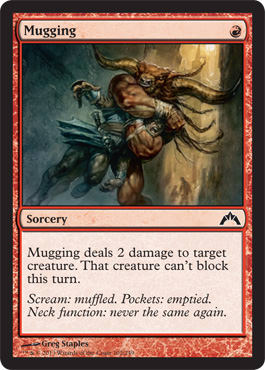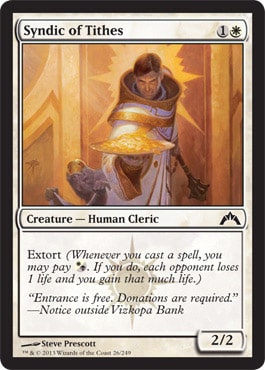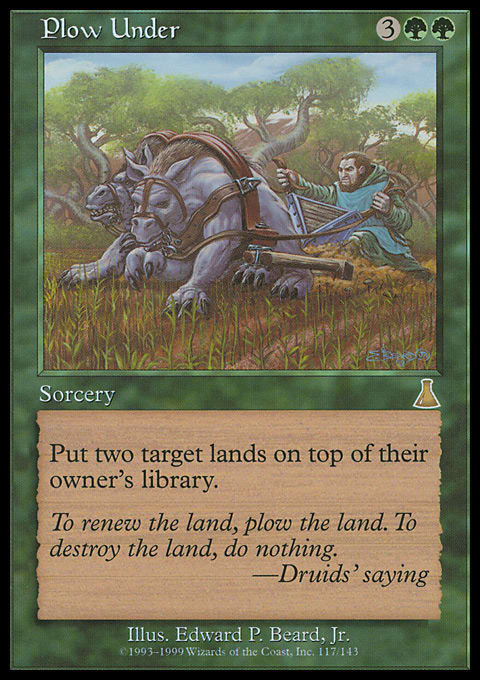Inside, I was fuming. I wanted to point out his luck. I wanted to comment on how he always “had it.” My deck was way too good to lose, especially to what looked like a pretty mediocre Boros deck. I had ample removal and a ton of extorters. I mean, four Kingpin's Pets don’t just happen.
And the one turn he had to draw Mugging—exactly Mugging—before I took over with Gift of Orzhova, he pulls it. He should know how lucky he is. I should tell him how lucky he is.
But I don’t. There are still twenty-five minutes left in the round after our blisteringly fast three-game set. I walk outside to be somewhere I can mutter to myself about his good fortune. I replay the game in my head, cursing every top-deck, every perfect card that keeps me from taking over the game, every . . .
I pause. It’s Austin in March, so the air is still warm despite the late hour. I sit on the hood of my car and stare at a wall, focused on the game I just played rather than at anything in particular. I replay a sequence over in my head. Did I really do that?
I made a mistake. A costly one.
Luck, as it turned out, had little to nothing to do with the outcome. I had screwed up. In a game with razor-thin margins, where everything can turn on one draw step, that, I’ve found, is usually the case.
Learning from Losing
I’ve been playing Magic for a very long time—nearly seventeen years, to be exactish. I’ve spent most of that time as a big fish in a small pond—the Friday Night Magic warrior, the local legend, the know-it-all with no higher-level experience. I’ve always been more focused on my career and involved in athletics, both of which took precedence over Magic.
That’s not to say I didn’t try to go bigger. I have a Top 8 Pro Tour Qualifier pin, back from when they gave out those sorts of things, but I’ve probably only played in maybe a dozen, if that, PTQs in my lifetime. There are some who do that in a year. I did go 7–1 at a Grand Prix on Day 1 once, but it happened to be a team Grand Prix, and we saddled one of our teammates with a truly terrible deck.
All of this is to say that since the days when I thought Skeleton Ship and Kjeldoran Frostbeast were the pinnacles of Magic cards, since I first discovered the wonder that was the BrowsePost deck, I’ve never really had to try that hard to become better. I had an early knack for the game and never particularly had the Pro Tour within my crosshairs. Becoming better wasn’t really ever the point.
But I’m also a very competitive individual. I have a healthy dose of Johnny in me, sure, but for every Mindmoil or Colfenor's Plans deck I brew, there’s a Cryptic Command, an Urza's Tower, a Remand (or four) lurking in the decklist. My “crazy” brews were always meant to win. So when I lost, I often secretly fumed—sometimes, not so secretly.
But I never really learned anything from losing.
That’s all changing. Not because I want to make the Pro Tour—I do, but I also love doing coverage and can rarely get away for a whole weekend for a PTQ—but because, at the ripe old age of thirty, I’ve learned there’s something valuable to learning.
Take the game in which I lost to Mugging. We had played very quickly, and I didn’t spend a ton of time making my decisions. Most were fairly automatic, as I was limited on both mana and options for much of the game. However, the turn when he cast Act of Treason was not one of those turns.
The board was his Daring Skyjek and Syndic of Tithes against my own Syndic of Tithes and Basilica Guards. He cast Act of Treason on my Syndic and swung, leaving up just one white mana.
If you can already see where this is going, you’re a better player than I am.
He had placed my Syndic of Tithes closest to my Basilica Guards, so seeing the math was the same, I just threw my Basilica Guards in front of the nearest Syndic—mine—and said block.
The truth is I didn’t even register the mistake at the time. If I just block his Syndic of Tithes rather than mine, my odds to win that game, and thus the match, go up astronomically. Smite was likely to be a dead card (and, honestly, I’m not sure why he had it in his deck . . . he didn’t block once in my Game 1 win, but that’s not terribly relevant since I could have played around it with no loss of anything), I would have had an extra blocker and an extra extorter, and Mugging would not have won him the game. I would have had my extra turn, and it’s very likely Gift of Orzhova would have been more than enough to seal it.
When I figured this out, I calmed down immediately. I had messed up the game—plain and simple. I actually almost went and apologized to the other player for being rude . . . before remembering that I hadn’t actually said anything rude to him.
Instead, I learned something. Never again will I forget to take into account Smite on a stolen creature. I will be better at Gatecrash Draft than I was before.
There are two lessons to take from this story. One: Never stop learning. I’ve been playing seventeen years, longer than many of the players I see on a regular basis have been alive, and I still have things I can learn. Accepting that is a pretty important step in not only becoming better—if that’s your goal—but also to being a better person.
The second is the same one that longtime players have heard over and over again, but it is worth repeating for newer ones: You aren’t entitled to win anything. Maybe you’re favored, maybe you’re ahead, or maybe the other player isn’t good or his deck is worse than yours, but that doesn’t mean you “should” win. It’s why we play the game. It’s why the top-decked Lightning Helix was exciting and why the called-shot Cruel Ultimatum is burned in our collective unconscious. And it’s also why, sometimes, you’re going to mull to five and lose to the kid with the Event Deck. We take the highs with the lows. It’s why we love the game.
Stop Playing Favorites
I love Duskmantle Seer. All seven of my readers can readily attest to that. I played my Esper “Flash” with Duskmantle Seer from the prerelease up until last week, only pausing for one tournament to try out Humanimator. Then right back to Vampire Bob.
Things change, however. Metagames shift, new cards rise, others fall. Conditions change, even locally.
In this case, two things were conspiring against Duskmantle Seer: the rise of the Giant Growth–based Naya Humans deck and the widely adopted use of Mizzium Mortars. Whereas mono-red, the previous fastest deck in the format, was once a close but favorable matchup, Naya Humans was a full turn faster and could punish a player more for stumbling. And Mortars was just gas against my sorcery-speed 4/4 for 4.
Seeing all of that, I made the wise, prudent move. I played with just three Duskmantle Seers instead of the full four, swapping in a last-minute Obzedat, Ghost Council.
Now, I ended up winning that particular tournament, but that result wasn’t the point. I won it in spite of Duskmantle Seer being in my deck, not because of it. It was a liability that I had to play around, not a strength I could play to.
So, I switched to R/W/U Flash. Because Gerry Thompson is usually right about these kinds of things. And because Boros Reckoner is gas.
Yes, there are things you can do to adapt. Dimir Charm becomes better in the face of Mizzium Mortars. Or I can play more Tragic Slips, Human Frailty in the sideboard (which is criminally underplayed, by the way), and more Unsummons.
But that’s missing the point. Duskmantle Seer was the liability, not the deck around it. Changing the deck doesn’t change that fact. So, I had to let it go. It’s currently among my favorite cards (don’t worry, Sphinx's Revelation, Azorius Charm, and Augur of Bolas, your slots are secure), but I had to let it go if I wanted to win. And, as we’ve already established, I can be somewhat grumpy when I don’t win.
I actually learned this lesson a long time ago. It was Regionals sometime after the release of Champions of Kamigawa. Ravager Affinity had already been banned into oblivion, and Tooth and Nail decks were everywhere. My favorite card at the time, and still my all-time favorite card, was Gifts Ungiven. I played it everywhere I could, and I was pretty lethal with it. That 7–1 GP performance? Greater Gifts, a Greater Good, Gifts Ungiven concoction that was both responsible for my Magic writing career, in a way, and for Frank Karsten’s second-place finish at Worlds in 2005.
But Greater Gifts wasn’t a thing yet. Instead, what I had was a homebrew that won by looping Mindslaver with Bringer of the White Dawn. Sakura-Tribe Elder and Kodama's Reach provided the ramp and fixing, Wrath of God kept me alive, and Gifts Ungiven tied it all together. The deck was actually very good.
The problem was that I couldn’t beat Plow Under to save my life. Not for a second. And as for the decks that played Plow Under into Eternal Witness returning Plow Under? All by turn four? Not a shot.
The thing was that those decks were everywhere. They were favorable against Tooth and Nail, which was also everywhere, so good players were Plowing through the field. And I knew they would. But I wanted to play my sweet, sweet brew.
Predictably, I was Plowed Under. Repeatedly. When I played against other decks, I rarely had had more fun playing Magic (though I can’t say the same for my opponents who just never got to play their own turns). When I played against Plow Under, I had rarely had less fun.
And it wasn’t because Plow Under was miserable (though it was); it was because Plow Under was miserable and I allowed myself to play right into it.
Since then, I’ve learned that no matter how much I love an individual card, each has its time and place. Duskmantle Seer had his time at the very dawn of the format (from what I’ve heard, no one really even tried Duskmantle Seer in Pro Tour testing, and there were maybe a total of four copies of the card that were even registered in Montreal, so there’s no way to say if I was actually right or not), but that time is no more.
Maybe next week.
Random Things I’m Thinking
Before I go, here are some of my latest notes/thoughts/brewing ideas for Standard that are rolling around in my head. I won’t have time to try any of them before flying off to Rio de Janeiro for the Grand Prix, but they’re definitely on my mind for future decks/articles.
- Abrupt Decay seems to be one of the best spells in Standard right now. Clearly, I want to Snapcaster it.
- Human Frailty. The card. Not the general condition.
- Gyre Sage and Loxodon Smiter in Bant midrange
- What if Pillar of Flames were broken in real life?
- Assemble the Legion is better than Jace, Memory Adept in Flash’s sideboard (tried this; believe it). It actually helps the Jund matchup quite a bit.
- More Gloom Surgeon. Possibly alongside Quirion Dryad.
- Huntmaster of the Fells sounds like a title I would give out in Crusader Kings 2




























